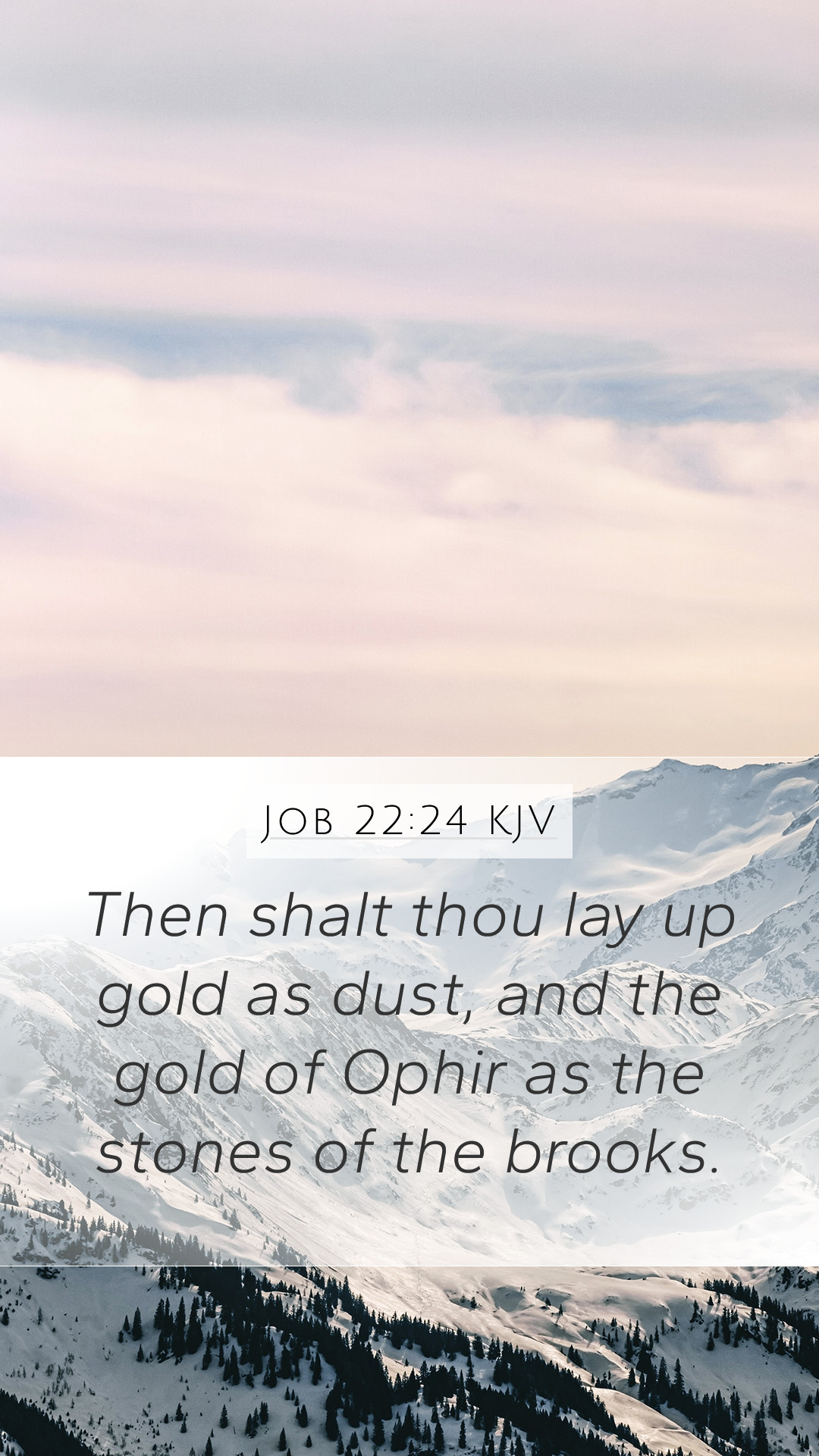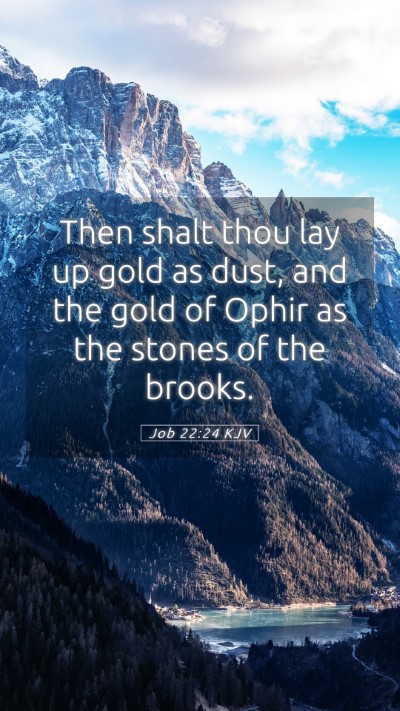Old Testament
Genesis Exodus Leviticus Numbers Deuteronomy Joshua Judges Ruth 1 Samuel 2 Samuel 1 Kings 2 Kings 1 Chronicles 2 Chronicles Ezra Nehemiah Esther Job Psalms Proverbs Ecclesiastes Song of Solomon Isaiah Jeremiah Lamentations Ezekiel Daniel Hosea Joel Amos Obadiah Jonah Micah Nahum Habakkuk Zephaniah Haggai Zechariah MalachiJob 22:24 Meaning
What is the meaning of Job 22:24?
Then shalt thou lay up gold as dust, and the gold of Ophir as the stones of the brooks.
Job 22:24 Bible Verse Meaning
Bible Verse Commentary: Job 22:24
Verse: "Then shalt thou lay up gold as dust, and the gold of Ophir as the stones of the brooks."
Overview: Understanding this verse involves reflecting on its rich symbolism and implications for wealth and spiritual well-being. Drawing from notable public domain commentaries, we can explore various insights into this scripture.
Meaning of Job 22:24
Job 22:24 conveys a profound message about the relation between righteousness and divine blessing. It metaphorically compares wealth to dust, suggesting that when one is in right standing with God, material possessions become significantly abundant and less valuable.
Commentary Insights
-
Matthew Henry's Commentary:
Henry emphasizes that the wealth mentioned in this verse symbolizes the blessings that come from aligning oneself with God’s will. He suggests that when a person strives for righteousness, their need for material wealth diminishes, as they are fulfilled by divine favor.
-
Albert Barnes' Notes:
Barnes remarks on the use of ‘gold’ as an emblem of ultimate prosperity, stating that the mention of ‘the gold of Ophir’ signifies extraordinary riches, which are made commonplace in the life of the righteous. He highlights the comparison of wealth to dust, illustrating the transcendence of spiritual riches over material possessions.
-
Adam Clarke's Commentary:
Clarke points out that this verse emphasizes the idea that true security and wealth come from a relationship with God. He highlights the allusion to the richness of gold in a figurative manner to encourage believers to prioritize spiritual over material wealth, suggesting that divine favor is the true source of abundance.
Key Themes
The overarching themes of this verse include:
- Divine Blessings: The idea that seeking God leads to blessings beyond mere financial wealth.
- Spiritual Wealth versus Material Wealth: Emphasizing the importance of spiritual growth over earthly riches.
- Righteousness and Its Rewards: The assurance that living a righteous life yields abundant blessings.
Application of the Verse
This verse can be applied to daily life in several meaningful ways:
- Prioritizing Spiritual Growth: Individuals are encouraged to focus on their relationship with God, recognizing that true wealth comes from spiritual abundance.
- Understanding the Value of Righteousness: Believers can find comfort in knowing that their efforts towards righteousness will be rewarded both in this life and in the life to come.
- Cultivating Gratitude: Embracing the blessings already present in one's life and fostering a spirit of thankfulness regardless of material circumstances.
Bible Study Insights
This verse serves as a catalyst for deeper Bible study insights and enriches our Bible verse understanding. When reflected upon within Bible study groups or online Bible study settings, it encourages dialogues about:
- How to interpret Bible verses that pertain to wealth.
- Understanding difficult Bible passages through a lens of spiritual significance over material value.
- The historical context regarding wealth during Job's time versus contemporary perspectives on riches.
Related Bible Verses
- Proverbs 10:22: "The blessing of the Lord, it maketh rich, and he addeth no sorrow with it."
- Matthew 6:19-21: "Lay not up for yourselves treasures upon earth... But lay up for yourselves treasures in heaven."
- 1 Timothy 6:17: "Charge them that are rich in this world, that they be not high-minded, nor trust in uncertain riches..."
Conclusion
In summary, Job 22:24 serves as a profound reminder of the relationship between righteousness, divine favor, and true wealth. The commentary provided helps in understanding scripture in a deeper way, reminding us of the overarching biblical perspective that encourages believers to seek spiritual riches above material gains. This Bible verse explanation enlightens individuals on how scripture can be applied to modern life, fostering a more profound and enriched understanding of divine prosperity.


